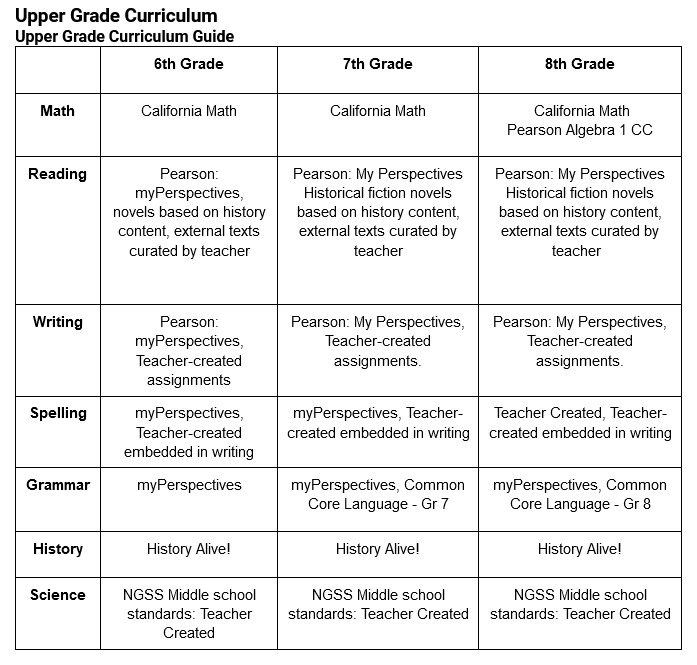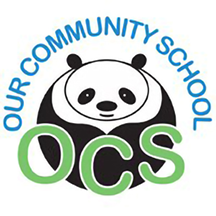Middle School

Upper Grade Language Arts Program (6th-8th): At OCS, we strongly believe that a standards-based, balanced literacy approach best serves the needs of the emerging reader and writer. Using books by known experts in balanced literacy such as Patricia Cunningham,[iii] Gail E. Thompkins,[iv] and Diane Snowball,[v], we seek to educate children in a meaningful language-rich environment.
The five main elements to the OCS English Language Arts program are:
- Reading Development
- Literature-Based Reading Comprehension Development
- Vocabulary Development within a Meaningful Context
- Writing Development
- Development of Listening and Speaking Skills
- Instruction and Assessment of the CCSS for ELA
OCS uses Pearson's myPerspectives as our primary language arts curriculum. myPerspectives is a new English language arts curriculum that values the perspective of the learner, collectively and individually, and provides next-gen learning experiences that promote higher achievement and develop the competencies needed for college and career readiness. Interactive learning blends print and technology in a student-centered, teacher-inspired classroom. This program creates an interactive, engaging, and relevant learning environment through readings, meaningful activities, and purposeful performance tasks. myPerspectives encourages social collaboration as well as student ownership of learning through goal setting, choice, and reflection.
Mathematics Program: California Math is used for Math 6, Math 7, and Math 8. For students in Algebra, state approved curriculum focusing on Algebraic standards is being used. Common Core aligned materials allow our students to utilize higher thinking skills while gaining experience with real-world situations, as well as the writing component of math.
Social Studies: Each teacher uses the National Standards in Social Studies, Science and Language Arts to identify and create three to five studies of integrated concepts each year, clustering standards in logical groupings. Our upper grade teachers use History Alive as a foundation for instruction.
Science: Consistent with the OCS school-wide philosophy of experiential, child-centered learning, students will be using the scientific process to engage in solving real life scientific problems. In keeping with the California Content and Next Generation Standards. OCS teachers will incorporate the three main areas of science: Earth Science, Life Science, and Physical Science. Teachers use components of FOSS learning modules and Education and the Environment Initiative units of study.
Democratic Classrooms: An integral part of our school Interdisciplinary Humanities Studies is the incorporation of democratic practices throughout the school, evidenced by:
- Democratic Classrooms: Students and teachers collaborate to create codes of conduct, develop and vote on rules to address ongoing classroom issues, and provide peer support using Responsive Classrooms and Developmental Designs program components.
- Service Learning: A school-wide program where each class develops and operates an ongoing service for the community (i.e.: lost and found, or recycling).
- Student Senate: Weekly student senate meetings led by our 8th graders with support by our Principal. Two representatives from each class identify issues, brainstorm and implement solutions as well as plan school spirit days and offer ideas for budgeting for school wide student needs.
- Conflict Resolution and Peaceful Learning Communities (PLCs): With adult support, students learn and take ownership of addressing concerns and conflicts openly and respectfully. Weekly classroom PLCs offer students as a group to resolve issues and give feedback to each other about their successes.
- Cooperation, Collaboration, and Communication: Extensive work where small groups of students must analyze assignments or problems together, communicate individual ideas, compromise for the good of their objectives, and create quality work.
- Buddy Classes & Assemblies: Younger and older buddy classes visit one another to develop relationships and to share work and support curriculum (culminating presentations at the close of a study). Student-led school assemblies allow our students to practice presenting skills and share their work. Whole school assemblies allow an opportunity for our community to come together to celebrate school events.

